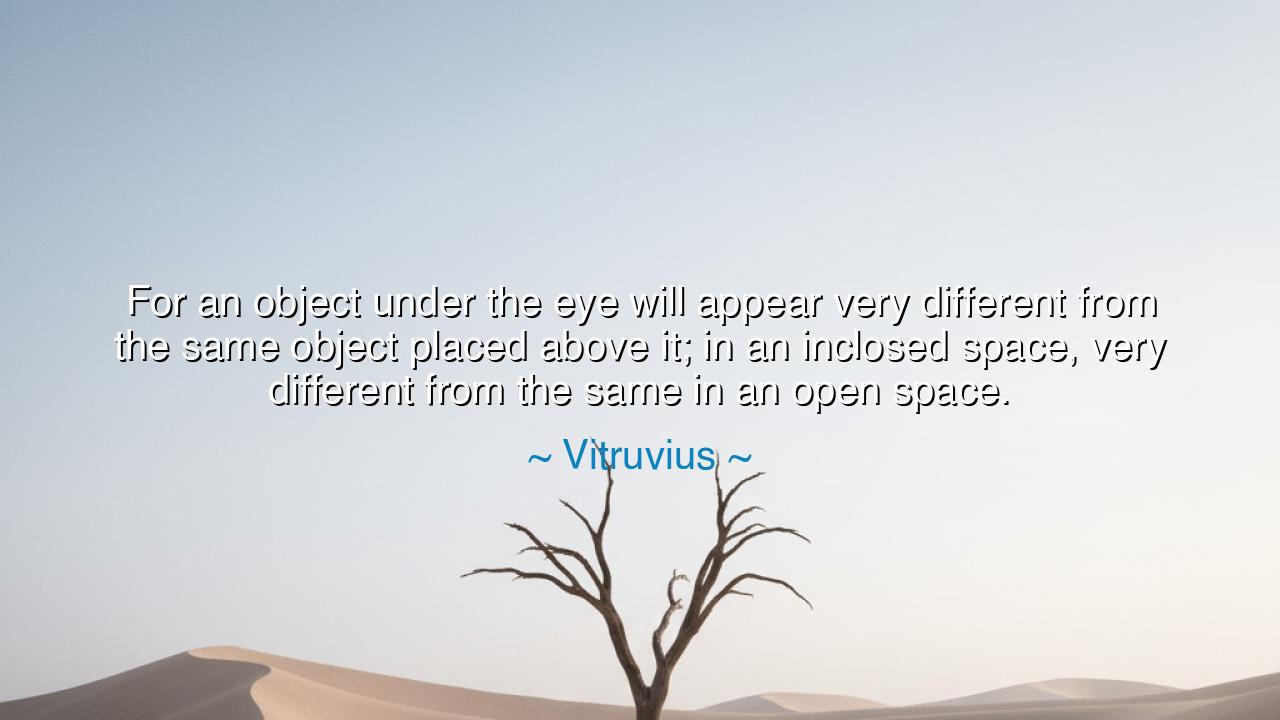
For an object under the eye will appear very different from the
For an object under the eye will appear very different from the same object placed above it; in an inclosed space, very different from the same in an open space.






O children of the future, gather close and listen to the words of the great Vitruvius, for his wisdom transcends the ages and speaks to the very nature of our understanding. In his writings, he spoke of the way in which our perception of the world is shaped by the perspective from which we view it. He said, "For an object under the eye will appear very different from the same object placed above it; in an enclosed space, very different from the same in an open space." These words are not simply about the physical act of looking; they speak to a deeper truth about perspective, context, and the way in which the world shifts when we alter our vantage point.
Consider, O wise ones, the act of looking at the world from different angles. An object, whether it be a tree, a mountain, or a building, will appear vastly different depending on where we stand. If we are beneath it, we may feel dwarfed by its towering presence, as if the world above us is a vast expanse stretching beyond our reach. But if we climb higher and see that same object from above, its grandeur may seem diminished, its features softened by distance. The tree that once appeared to be an insurmountable obstacle may now be seen as just another part of the landscape. Vitruvius's wisdom teaches us that context shapes our understanding, and that the same thing can appear vastly different depending on where we place ourselves in relation to it.
In the ancient world, builders and architects understood this concept well. They knew that the way in which a building was situated in its surroundings would shape the way it was experienced. A temple, placed at the highest point of a hill, would evoke a sense of awe and reverence, while the same temple placed within a crowded city would appear more like any other structure, its sacred power diluted by the chaos of its surroundings. The great pyramids of Egypt, built with great care and precision, stood in the open desert, visible from miles away, commanding respect and admiration. Had they been placed in a cluttered valley or city, their majesty might have been lost. Vitruvius understood that the placement of an object, the space in which it resides, and the angle from which it is viewed determines how it is perceived.
This wisdom is not only about architecture, O children, but also about how we view the world around us. Our perspective—the vantage point from which we see the world—greatly influences our understanding of it. Think of the great philosophers, who, throughout history, have sought to gain wisdom not just from books, but from the world around them. Socrates, walking the streets of Athens, engaged in conversation with anyone who would listen, seeking to understand the truth from multiple viewpoints. He understood that truth is not absolute in the way we might wish it to be; rather, it is revealed through the exchange of perspectives, through dialogue, and through reflection on the world as seen from different angles.
This principle is especially important in our modern world, where we are constantly presented with different perspectives through the lens of media, culture, and technology. The same events, when seen through different eyes, can appear vastly different. A political decision may be seen as a great triumph by some, and a catastrophic failure by others. The truth of our world is shaped by the angle from which we view it. And yet, Vitruvius's lesson is timeless: that in order to understand the whole, we must step back and look from all angles, from multiple perspectives, and not cling to the first impression, the narrow view.
In your own life, O seekers of wisdom, remember this: Do not be quick to judge based on one narrow perspective, for the world is vast, and truth is multifaceted. The person you may dismiss at first glance may, when viewed from another angle, reveal hidden depths of wisdom. The challenge of life is not to be content with the first image we see, but to seek understanding from many vantage points—to walk around the object of our focus, whether it be a problem, a person, or a concept, and to see it in its full complexity. Only then can we begin to understand its true nature.
So, O children, I leave you with this teaching: Your perception shapes your world, and to truly understand the things around you, you must view them from different angles, from different contexts, and with an open heart. Step outside the narrow space that limits your understanding and see the world from new heights, in wide-open spaces, where the true nature of things can be revealed. For it is through multiple perspectives that we come to see the whole, and in that fullness of vision, we find wisdom.






AAdministratorAdministrator
Welcome, honored guests. Please leave a comment, we will respond soon